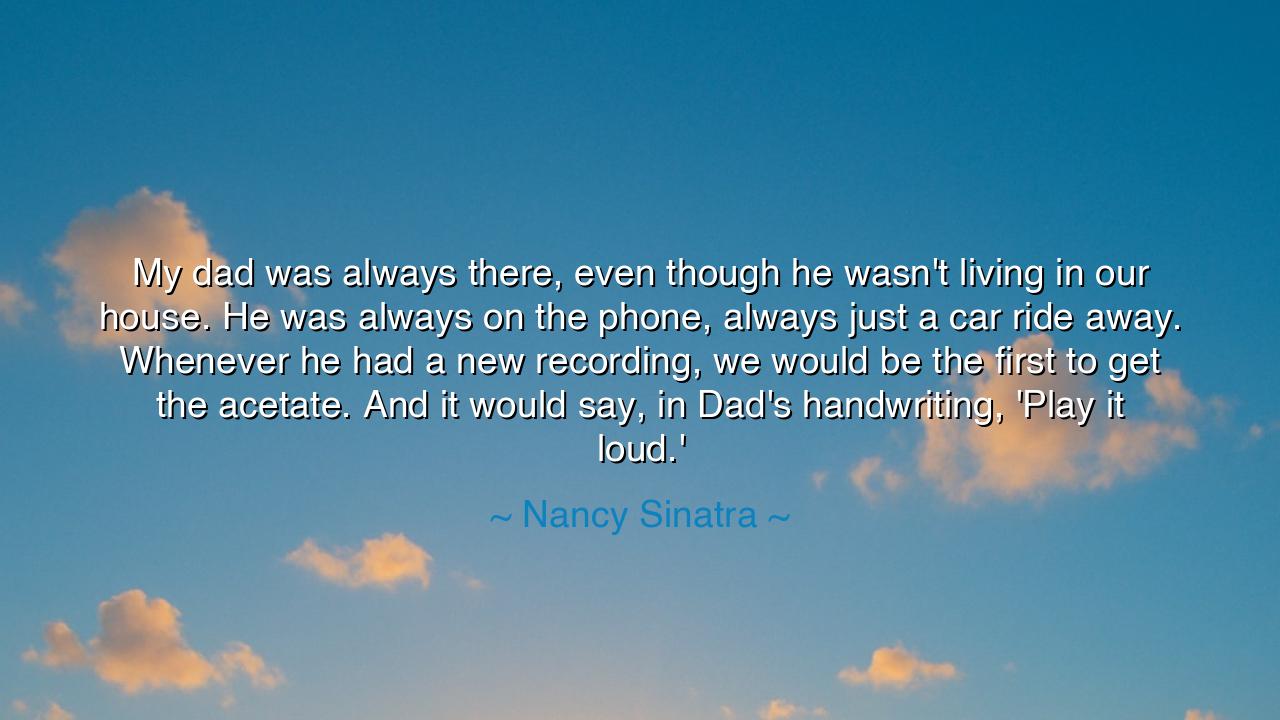
My dad was always there, even though he wasn't living in our
My dad was always there, even though he wasn't living in our house. He was always on the phone, always just a car ride away. Whenever he had a new recording, we would be the first to get the acetate. And it would say, in Dad's handwriting, 'Play it loud.'






In the words of Nancy Sinatra, “My dad was always there, even though he wasn’t living in our house. He was always on the phone, always just a car ride away. Whenever he had a new recording, we would be the first to get the acetate. And it would say, in Dad’s handwriting, ‘Play it loud.’”
These words are not merely a daughter’s remembrance — they are a hymn to presence, to connection, and to the enduring power of love expressed through creation. Within them breathes the spirit of family, of music, and of that sacred bond that endures even across the quiet distances that life demands. It is the song of a father and daughter bound not just by blood, but by sound — by the echo of one soul calling to another through the melody of memory.
Frank Sinatra, her father, was a man whose voice carried across the world — the embodiment of rhythm, romance, and rebellion. Yet Nancy reminds us here that even the great must balance the demands of destiny with the duties of love. Though fame carried him far from home, his heart remained near. The telephone, the car ride, and the recording became his bridges — humble instruments through which affection crossed the distances of time and place. For greatness does not lie only in performance before the world, but in one’s quiet faithfulness to those who wait at home.
The phrase “Play it loud” is more than an instruction about music; it is the symbol of a philosophy. To play it loud is to live unafraid — to feel deeply, to speak boldly, to embrace the full resonance of life. In that handwritten note, one hears a father’s blessing: Do not live small, my child. Do not whisper your joy. Let your heart be heard. It is an echo of the ancient call of the soul — the call to live authentically, to express without shame, to bring one’s inner melody forth into the world.
So too, in older times, there were fathers who passed not gold or power to their children, but wisdom and fire. The philosopher Marcus Aurelius, emperor of Rome, left his son not a throne alone, but a book of meditations — guidance on how to live as both ruler and man. And long before that, the craftsman fathers of Greece taught their children how to carve stone with purpose, how to turn raw marble into beauty. In every age, true parents leave their children something eternal: not merely a name, but a way of being. Frank Sinatra left his daughter not just songs, but the courage to sing her own.
There is also a deeper truth hidden within Nancy’s remembrance — the idea that love can exist beyond presence, and that distance need not mean absence. The world teaches us that closeness is measured in miles, yet the ancients knew that the heart defies geography. A father’s voice, even through a phone or a record, can still reach the soul of a child. This is the enduring miracle of love: it finds a way to speak, even when the body cannot be near. Like music traveling through air, it is unseen yet unforgettable.
The lesson is this: true connection is not bound by walls or time. It is carried through acts of remembrance, through shared passions, through the care that lingers even in absence. To those who love — be present in whatever way you can. A message, a gesture, a gift of your art may carry more warmth than you know. And to those who are loved — listen for the song that your dear ones leave behind, for it will continue to play softly beneath the noise of the world.
So, children of the ages, take these words and let them become your guide: “Play it loud.” Play your life boldly. Speak your truth, create your beauty, and let your love resound through all you do. Even when distance divides, let your devotion find its way — through your words, your art, your kindness. For in the end, the measure of a life is not in how near we stand, but in how deeply we are heard. And if you live with that courage — to love fiercely and to live loudly — your voice too shall echo through the generations, like a timeless song that never fades.






AAdministratorAdministrator
Welcome, honored guests. Please leave a comment, we will respond soon